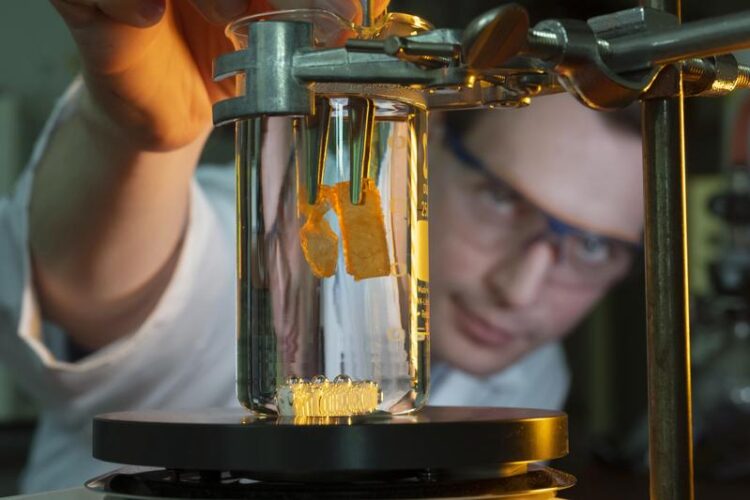Plastic can be sustainable

Dr. Stefan Zechel from the University of Jena studies the shape memory behaviour of plastics. It is shown how a plastic in a deformed shape (left) returns to its original shape (right).
Jens Meyer/University of Jena
Jena research group receives two million euros to develop intelligent, recyclable plastic materials
Sustainable plastics that have the ability for self-healing, have intelligent properties and can be recycled if required will be the subject of future research at Friedrich Schiller University Jena (Germany). A project in this field, coordinated by the chemist and materials scientist Prof. Ulrich S. Schubert, is being granted two million euros in funding from the Carl Zeiss Foundation.
Repairing scratches with a hair dryer
“Imagine scratched surfaces on household furniture, for example in the kitchen,” says Schubert, describing a possible application for these intelligent plastics. “You simply heat up the relevant surface – for example with a hair dryer – and it not only looks like new, it is new.” These vitrimers, as they are known, are intended not only to make everyday objects more durable, so that they need to be replaced less frequently, and, thus, have an important environmental impact. They can also be recycled more easily.
“Composite materials in particular are extremely difficult – if not impossible – to recycle, because the materials used in them are virtually impossible to separate,” explains Schubert. This problem is shown clearly when wind turbines have to be replaced. “Large amounts of waste are generated, even just by the rotor blades. Apart from a few exceptions, there is no suitable strategy for reusing these resources.”
This situation could be changed with intelligent materials such as vitrimers. “These materials are switchable,” says Schubert. “That means that their processability can be controlled in a defined manner.” In theory, one could produce composite materials that could be separated and reused if necessary. This is exactly what the team coordinated by Schubert wants to study over the next five years.
“We are particularly interested in fibre-reinforced materials,” adds Schubert. “In this work, we want to embed glass and carbon fibres in the new plastics, which can, among other things, be used for lightweight construction and to reduce CO2 emissions. However, we are also interested in nanocomposites, in which nanofillers reinforce the material.”
On the way into our everyday lives
The Jena scientist is convinced that these sustainable plastics will eventually find their way into our everyday lives and will one day be used in aircraft, on surfaces or in tennis rackets, for example. “Vitrimers are still a very young class of polymers. As yet, there are no specific practical applications. However, our goal is enabling a new generation of sustainable materials by our research.”
The prospects for this are excellent. “When it comes to researching innovative polymer materials, Jena clearly ranks among the top German universities,” says Schubert. This is demonstrated not least by the new Center for Energy and Environmental Chemistry Jena II (CEEC Jena II) and the attached CEEC Jena Application Centre, in which a total of 50 million euros are currently being invested and which will further strengthen the University of Jena as a research location in this field.
Schubert and the project consortium have also convinced the Carl Zeiss Foundation of the merits of the study. The ambitious project has now been approved for substantial funding of two million euros over a period of five years.
“Normally, you only receive such a sum for a large coordinated project of the German Research Foundation,” explains Schubert. In the coming years, eight doctoral candidates will study this new class of materials, from their synthesis and processing, through their underlying mechanisms to their environmental impacts. A new junior research group will also be established.
Wissenschaftliche Ansprechpartner:
Prof. Dr Ulrich S. Schubert
Center for Energy and Environmental Chemistry Jena (CEEC Jena) of Friedrich Schiller University Jena
Philosophenweg 7a
07743 Jena, Germany
Tel.: +49 (0)3641 / 948200
E-Mail: ulrich.schubert@uni-jena.de
Media Contact
All latest news from the category: Materials Sciences
Materials management deals with the research, development, manufacturing and processing of raw and industrial materials. Key aspects here are biological and medical issues, which play an increasingly important role in this field.
innovations-report offers in-depth articles related to the development and application of materials and the structure and properties of new materials.
Newest articles

You are What You Eat—Stanford Study Links Fiber to Anti-Cancer Gene Modulation
The Fiber Gap: A Growing Concern in American Diets Fiber is well known to be an important part of a healthy diet, yet less than 10% of Americans eat the minimum recommended…

Trust Your Gut—RNA-Protein Discovery for Better Immunity
HIRI researchers uncover control mechanisms of polysaccharide utilization in Bacteroides thetaiotaomicron. Researchers at the Helmholtz Institute for RNA-based Infection Research (HIRI) and the Julius-Maximilians-Universität (JMU) in Würzburg have identified a…

ASXL1 Mutation: The Hidden Trigger Behind Blood Cancers and Inflammation
Scientists show how a mutated gene harms red and white blood cells. LA JOLLA, CA—Scientists at La Jolla Institute for Immunology (LJI) have discovered how a mutated gene kicks off…



